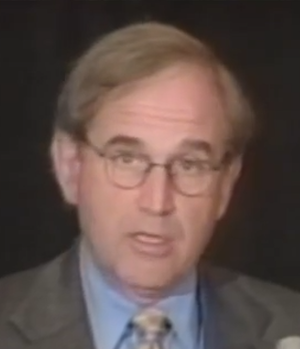Richard McGinn
( businessman) | |
|---|---|
 | |
| Born | 1946 New Jersey, USA |
| Nationality | US |
| Alma mater | Grinnell College |
US telecom executive who attended the 1999 Bilderberg, where one of the topics was "The Relationship between Information Technology and Economic Policy". | |
Richard A. McGinn is a US business executive in the global communication systems, networking, and technology industries.[1] McGinn was President, then CEO and Chairman of the telecom Lucent Technologies from 1996 to 2000. He attended the 1999 Bilderberg meeting, where one of the topics was "The Relationship between Information Technology and Economic Policy"[2].
Career
McGinn was lifetime AT&T employee, joining immediately after graduating from college in 1969.[3]
Lucent was a spinoff from AT&T in 1996. McGinn became CEO in 1997. Lucent became a "darling" stock of the investment community in the late 1990s, and its split-adjusted spinoff price of $7.56/share rose to a high of $84. Its market capitalization reached a high of $258 billion, and it was at the time the most widely held company with 5.3 million shareholders.[4]
At the start of 2000, Lucent's "private bubble" burst, while competitors like Nortel Networks and Alcatel were still going strong; it would be many months before the rest of the telecom industry bubble collapsed. Previously Lucent had 14 straight quarters where it exceeded analysts' expectations, leading to high expectations for the 15th quarter, ending Dec. 31, 1999. On January 6, 2000, Lucent made the first of a string of announcements that it had missed its quarterly estimates, as CEO McGinn grimly announced that Lucent had run into special problems during that quarter—including disruptions in its optical networking business—and reported flat revenues and a big drop in profits. That caused the stock to plunge by 28%, shaving $64 billion off of the company's market capitalization. When it was later revealed that it had used dubious accounting and sales practices to generate some of its earlier quarterly numbers, Lucent fell from grace. It was said that "Rich McGinn couldn't accept Lucent's fall from its early triumphs." He described himself once as imposing "audacious" goals on his managers, believing the stretch for performance would produce dream results.
In June 2000, Lucent announced it would acquire Chromartis, an Israeli maker of optical network equipment, for $4.5 billion.[5] In November 2000, the company disclosed to the Securities and Exchange Commission that it had a $125 million accounting error for the third quarter of 2000, and by December 2000 it reported it had overstated its revenues for its latest quarter by nearly $700 million. Although no wrongdoing was found on his part, McGinn was forced to resign as CEO and he was replaced by Henry Schacht on an interim basis.[6]
Event Participated in
| Event | Start | End | Location(s) | Description |
|---|---|---|---|---|
| Bilderberg/1999 | 3 June 1999 | 6 June 1999 | Portugal Sintra | The 47th Bilderberg, 111 participants |
References
- ↑ https://www.ipvspac.com/team-bios/rich-mcginn-ipvf
- ↑ https://wikispooks.com/wiki/Bilderberg/1999
- ↑ https://www.edn.com/the-man-who-built-lucent/
- ↑ https://web.archive.org/web/20131220041042/http://money.cnn.com/magazines/fortune/fortune_archive/2003/07/07/345538/
- ↑ https://www.wsj.com/amp/articles/SB959774423432738481
- ↑ https://www.wsj.com/articles/SB972307115490592450